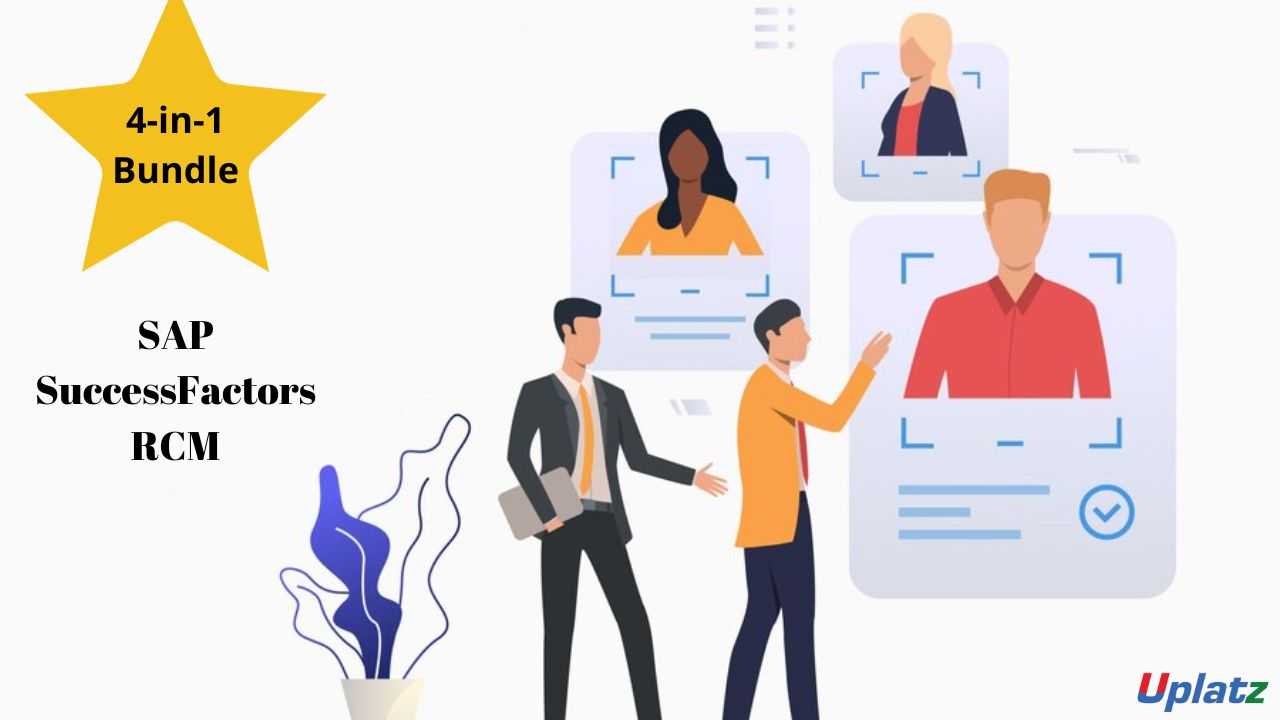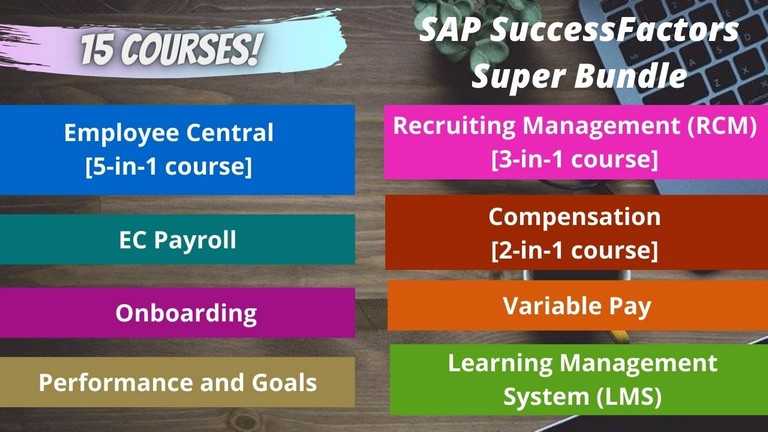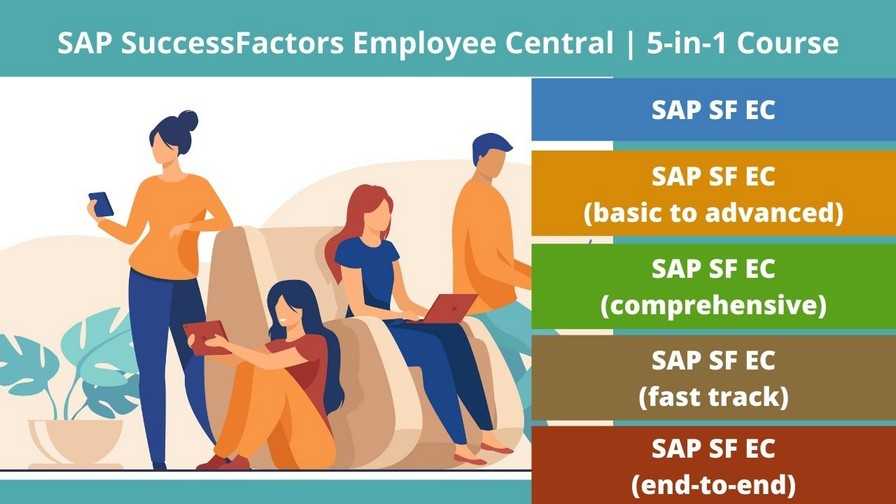SAP SuccessFactors Employee Central (basic to advanced)
Learn Proxy Management, Foundation & Custom Object, Association, Picklist & Data Models etc. in Employee Central. Become SAP SuccessFactors Consultant View Course Curriculum
Price Match Guarantee
Full Lifetime Access
Access on any Device
Technical Support
Secure Checkout
Course Completion Certificate
View Course Curriculum
Price Match Guarantee
Full Lifetime Access
Access on any Device
Technical Support
Secure Checkout
Course Completion Certificate
 90% Started a new career
BUY THIS COURSE (GBP 29)
90% Started a new career
BUY THIS COURSE (GBP 29)
-
 98% Got a pay increase and promotion
98% Got a pay increase and promotion
Students also bought -
-

- Bundle Multi (4-in-1) - SAP SuccessFactors RCM
- 75 Hours
- GBP 22
- 562 Learners
-

- Bundle Super - SAP SuccessFactors
- 250 Hours
- GBP 22
- 846 Learners
-

- Bundle Multi (5-in-1) - SAP SuccessFactors Employee Central
- 100 Hours
- GBP 22
- 1930 Learners

SAP SuccessFactors Employee Central is a cloud based solution to automate the entire HR process of an enterprise and to make the whole of the process much simple, convenient and in a faster way. SAP SuccessFactors Employee Central helps in managing the complete events occur for an employee like date-of-joining, promotion, transfer, etc. and other activities in a more centralized way. It provides a better quality HR solution to the enterprises.
Companies are always in need of good HR professionals who can manage the entire hiring process for the organization. Learning the SAP SuccessFactors Employee Central course will help a learner in knowing the complete HR automation process and how to manage the employees profile in a more centralized and organized way. It is one of the most popular HR systems in the market and is used by thousands of organizations worldwide.
There are several reasons why SAP SuccessFactors Employee Central has become so popular:
1. Cloud-Based: SAP SuccessFactors Employee Central is a cloud-based system, which means that it can be accessed from anywhere with an internet connection. This can be particularly beneficial for organizations that have a distributed workforce or employees who work remotely.
2. Scalable: SAP SuccessFactors Employee Central is designed to be scalable, meaning that it can grow with an organization as it expands. This can be particularly beneficial for organizations that are looking for a long-term solution to their HR management needs.
3. Flexibility: SAP SuccessFactors Employee Central is highly configurable, allowing organizations to customize the system to meet their specific requirements. This can include customizing workflows, creating new data fields, and configuring security settings.
4. Comprehensive: SAP SuccessFactors Employee Central provides a single source of truth for all employee data, including personal information, employment history, job information, compensation, and benefits. The system also enables organizations to manage their HR processes more efficiently and accurately.
5. Integration: SAP SuccessFactors Employee Central is designed to integrate with other SAP systems and third-party applications, which can further enhance its functionality and provide a more seamless user experience.
6. User-Friendly: SAP SuccessFactors Employee Central provides employees with self-service tools to update their own information and access HR services. The system is also designed to be user-friendly, making it easy for employees to navigate and use.
7. Mobile Access: SAP SuccessFactors Employee Central can be accessed on mobile devices, which can be particularly beneficial for employees who are on the go or who work remotely. This enables employees to access their HR information and complete HR tasks from anywhere, at any time.
8. Compliance and Security: SAP SuccessFactors Employee Central is designed to comply with local and international regulations, including GDPR and other data privacy laws. The system also includes robust security features, such as role-based access control and data encryption, to help protect sensitive employee data.
9. Analytics and Reporting: SAP SuccessFactors Employee Central provides powerful analytics and reporting tools that enable organizations to gain insights into their workforce and HR processes. This can help organizations to make more informed decisions and improve their HR strategies.
10. Continuous Improvement: SAP SuccessFactors Employee Central is continuously updated with new features and capabilities, ensuring that the system remains up-to-date with the latest HR trends and best practices. This can be particularly beneficial for organizations that want to stay ahead of the curve and ensure that their HR processes are always optimized.
SAP SuccessFactors Employee Central is a powerful and flexible HR management system that can help organizations to streamline their HR processes, improve data accuracy, and enhance the employee experience.
Uplatz provides this end-to-end training on SAP SuccessFactors Employee Central with self-paced videos covering all configurations and features of SAP SF EC module. You will be awarded a Course Completion Certificate upon successful completion of the course.
Course/Topic - SAP SF EC (basic to advanced) - all lectures
-
Lecture 1 - SAP SuccessFactors Employee Central (basic to advanced)
-
Lecture 2 - SAP SuccessFactors Employee Central (basic to advanced)
-
Lecture 3 - SAP SuccessFactors Employee Central (basic to advanced)
-
Lecture 4 - SAP SuccessFactors Employee Central (basic to advanced)
-
Lecture 5 - SAP SuccessFactors Employee Central (basic to advanced)
-
Lecture 6.1 - SAP SuccessFactors Employee Central (basic to advanced)
-
Lecture 6.2 - SAP SuccessFactors Employee Central (basic to advanced)
-
Lecture 7 - SAP SuccessFactors Employee Central (basic to advanced)
-
Lecture 8 - SAP SuccessFactors Employee Central (basic to advanced)
-
Lecture 9 - SAP SuccessFactors Employee Central (basic to advanced)
-
Lecture 10 - SAP SuccessFactors Employee Central (basic to advanced)
-
Lecture 11 - SAP SuccessFactors Employee Central (basic to advanced)
-
Lecture 12 - SAP SuccessFactors Employee Central (basic to advanced)
-
Lecture 13 - SAP SuccessFactors Employee Central (basic to advanced)
-
Lecture 14 - SAP SuccessFactors Employee Central (basic to advanced)
-
Lecture 15 - SAP SuccessFactors Employee Central (basic to advanced)
-
Lecture 16 - SAP SuccessFactors Employee Central (basic to advanced)
-
Lecture 17.1 - SAP SuccessFactors Employee Central (basic to advanced)
-
Lecture 17.2 - SAP SuccessFactors Employee Central (basic to advanced)
-
Lecture 18 - SAP SuccessFactors Employee Central (basic to advanced)
-
Lecture 19 - SAP SuccessFactors Employee Central (basic to advanced)
-
Lecture 20 - SAP SuccessFactors Employee Central (basic to advanced)
-
Lecture 21 - SAP SuccessFactors Employee Central (basic to advanced)
-
Lecture 22 - SAP SuccessFactors Employee Central (basic to advanced)
• Learn how to use Employee Central to complete Employee, Manager, and HR Administrator tasks associated with creating and maintaining the data required for processing payroll.
• SAP SuccessFactors Training Course will make you expert in Payroll, Employee Central, Mastery Management, Compensation Management and Performance goal Managements Concepts with Real-Time Projects and Certifications.
• It is the Latest emerging technology introduced by SAP. Using Sap Success factors we can able to analysis the performance and goals of the employees.
• Guide you how to change your resume with SAP HCM project.
• Learn how to Manage HCM Process using SAP HCM Cloud Software.
• Learn to create short term goals within the onboarding workflow.
-
What is SAP SuccessFactors
-
Difference between SAP HCM and SAP SuccessFactors
-
Systems used to configure SAP SuccessFactors
-
Resources available to consultants
-
Implementation and Integration Information
-
Management of data, user records, and security
-
Configuration of Rating Scales, Route Maps, and the Employee Profile
-
SuccessFactors Language Packs
-
Analytics
-
Explain Employee Central as an HRIS, including features and functions from both an end-user and implementation viewpoint and how it is used as a System of Record
-
Prepare a basic EC test environment
-
Foundation Table creation, configuration and management
-
HR Data configuration and management
-
Implement Role-Based Permissions (RBP)
-
Implement Self-Service including Events/Event Reasons and Workflows
-
Describe and configure MDF, Rules Engine, Reporting, Time Off, and Integration (HRIS-Sync and API Users)
-
Describe the role of the EC Consultant in Payroll and Benefits
Detailed-level topics:
Define XML components
· You will also learn how to use XML with EC and implement best practices for XML management.
· Describe the XML for EC
· Implement best practices for XML management
Back-end Provisioning and Admin Center in the EC instance.
· You will also learn how to customize an instance, set up the Admin Center interface, and use the functions and features of the EC instance.
· Differentiate between Provisioning and Admin Center
· Customize an Instance
· Set up the Admin Center Interface
· Using Functions and Features in the EC Instance
Turn on the People Profile
· Managing User Access
· Managing Security Using Role-Based Permissions (RBP)
· Implementing Data Changes and Reviewing Audit Trails
· Different administrator types and role of proxies in EC. You also learn how to track changes and insertions in EC records.
· Examine RBP
· Set up RBP
Customizing and Populating a Foundation Object (FO) Records
· Configuring the Country-Specific Fields (CSF) for Foundation Objects
· Identifying and Adding Picklists to Foundation Objects (FO), Define Foundation Objects (FO) and Fields
Create FO Records
· Create FO Data and MDF FO Structures, Add picklists to FO
· How to examine employee data in the instance, Add new employees using the import process
· Maintain employee records using system templates
· Implement mass changes in Admin Center
· Configure the Succession Data Model. configure CSF fields. Configure the national ID and address in the CSF Succession Data Model
· Configure global information in the CSF Succession Data Model
· Configure job information in the CSF Succession Data Model
HRIS Propagation
· Foundation Object Association
· Company Structure Overview
· Creating Internal Integration using HRIS Synchronization
· Translating Foundation Object Data, Set up propagation mapping
· Configure the HRIS propagation XML file
Company Structure Overview
· HRIS synchronization. You will also learn how to activate synchronization jobs manually and automatically and create a custom synchronization map, Define HRIS synchronization
· Activate Synchronization Jobs Manually and Automatically
· Create a custom synchronization map
Translate foundation data
· Managing Role-Based Permissions (RBP) for Self-Service Access
· Customizing Self-Service Transactions Using Workflows
· Event Reason Derivation
Manage Business Configuration
· Customize Workflows
· Customize MSS using workflows
Create an event reason
· Building Meta Data Framework (MDF) Objects for Employee Central (EC)
· Customizing an MDF Object Using Configurable UI
· Creating a Configurable Rule Using the Rules Engine
· Configurable UI elements, tools, and the customization process. You also learn how to add a custom UI to the employee files and create a Meta Data Framework (MDF) object for employee assets.
Main attributes of the Rules Engine
· Describe the Rules Engine logic types
· Apply rules to the Configurable UI
· Locate rule events
· Assign rules to Human Resource Information System (HRIS) elements and field events Create a configurable rule for use in existing EC objects
Setting up Position Management
· Leave of Absence
· Contingent Workers
· Dependents Management
· Contingent Workers
This SAP SF EC Basic to Advanced training course is designed for clearing theSAP Certified Application Associate- SAP SuccessFactors Employee Central 1H/2020exam.
The SAP successfactors is a cloud-based HR business solution to manage an organization. This business solution is designed on a Software as a service model. The SAP SF EC tool is designed to cater the needs of enterprise class organizations.
The SAP SF EC Associate certification exam covers data models, business rules, event reason derivation, foundation objects and more.
Uplatz Course Completion Certificate will be awarded upon the completion of the SAP SF EC Basic to Advanced course training.
The SAP SF EC certification exam verifies that the participants possess basic knowledge and can prove their skills in the area of SAP success factors employee central. This SAP SF EC certification exam validates that the participant has a strong understanding about this consultant profile, and able to implement the knowledge practically in projects.
Below given are the certification Details of SAP Certified Application Associate- SAP Success Factors Employee Central 1H/2020
• Certification Level: Associate
• Exam Name: SAP Certified Application Associate- SAP Success Factors Employee Central 1H/2020
• Exam Code: C_THR81_2005
• Exam Mode: Online
• Total Number of Questions: 80
• Pass Score: 66%
• Time Duration: 180 Minutes
• Exam fee: $550
Career Path and Job Prospects
The SAP SF EC Consultant draws an average salary of $73,881 per year depending on the knowledge and hands-on experience. The demand for SF EC consultants are huge in this developing industry.
If you're interested in a career in success factors employee central field, then SAP SFEC Basic to Advanced is a great courseto pursue.There is a great demand for SAP SF EC consultant in the field of employee central module which comprises personnel administration, help desk feature, organisation management and more. The SAP SF EC consultant job roles are growing exponentially considering the skill of delivering core HR services for varied workforce.
The SAP SF EC certification is targeted for HR professionals who want to excel in employee centralmodule.
The following are the job titles:
• SAP SF EC Associate
• SAP SF HCM Consultant
• SAP SFEC Consultant
• SAP SF EC Functional Consultant
• SAP Consultant
The SAP SF EC Basic to Advanced course helps the participants to learn and implement the learnt concepts in an enterprise.
Q.1. How do you integrate Employee Central with other SuccessFactors Products?
Employee Central integrates internal with other SuccessFactors products through HRIS Sync.
Q.2. How do you integrate Employee Central externally with other products?
There is a cloud -based integration platform available for external integration.
Q.3. What does the Succession Data Model contain?
The Employee Records are contained in the Succession Data Model. The succession data mode configures the fields that will appear in the Employee’s Personal Information (outside of work) Employment Information (inside of work).
Q.4. What is configured in the Country -Specific Succession Data Model?
Address formats, country specific fields and international standards are set in the country-spe, succession data model.
Q.5. What does the Corporate Data Model define?
Foundation Objects and their relationships are defined in the corporate data Model. Foundati, Objects are also called Foundation Tables. They include Organization, Job and Pay.
Q.6. What is defined in the Country -Specific Corporate Data Model?
In here foundation objects fields for a separate country are defined.
Q.7. What is the propagation data model used for?
HRIS Propagation Data Model is used for the Auto Population from Foundation Tables
Q.8. What other two data models are used?
Data Model Workflow Rules Data Model, Event and Event Derivation Rules Data Model
Q.9. How many data models are there in Employee Central?
7
Q.10. How do you masked sensible data in a field?
Set the attribute pii=”true”
Q.11. How do you set a field so the user can edit it?
Set the attribute visible=”both”
Q.12. How do you make a field to be required to be filled?
Set the attribute required=”true”
Q.13. What is a DTD?
Document Type Definition of the data model
My vision is to build a truly integrated HR in the cloud. A truly integrated HR is the key enabler for Organizations to maximize their business outcomes.
Q.14. Why are they called ‘SuccessFactors’?
Because they are behaviors which lead to successful performance in the job.
Q.15. Why are there three levels within the framework?
They describe a range of different types of behavior which are relevant to a range of different job roles. However, the levels are not hierarchical.
Q.16. Are the levels linked to job grades?
No. Just because someone is on a certain job grade, it doesn’t rule out any of the levels. However, if a job is more senior you would expect to see more of the university level behaviours.
Q.17. Are they going to apply to academic staff as well?
There is a similar framework for Strategic Leaders Framework and one for researchers which have been based on Success Factors. The idea going forward is to have something similar for all staff groups in the university.
Q.18. Will Success Factors be used to ‘get rid’ of people?
That is not why they have been developed. They are used to develop individuals. However, if the behaviour(s) are essential to the job and there continues to be no development then it could become a performance issue.
Q.19. What if the employee doesn’t agree with the Success Factors that their manager has chosen?
The manager uses the job analysis information to determine the Success Factor for the role in conjunction with discussions with the individual. However, it is ultimately the manager’s decision.
Q.20. Once a Success Factor has been chosen for a role can it be changed?
Yes; it depends on the requirements / needs of the role at any point. It is fluid and therefore may change year on year.
Q.21. If a Success Factor is changed during the year how do you know what you will be reviewed against at the next PDR?
Through dialogue / communication between the manager and the individual. The change can also be flagged on the PDR form.
Q.22. Do you have to choose the same level (e.g. self) for all the Success Factors identified?
No. However, it may be that they tend towards one level.
Q.23. If SuccessFactors are important – how do you pick the right ones?
Use the job analysis information and advice from your HRO and other managers with the same roles to determine the 3-5 core success factors. It will become easier with practice.
Q.24. What if the Success Factor for a role is what the job requires as a technical output e.g. communicating for a careers’ adviser?
There may be a ‘technical’ requirement to do that but successFactors are about ‘how’ the job is done / the behaviours required in carrying out their job.
Q.25. If an individual achieves all the Success Factors does that mean they will get promoted / get more pay?
Not directly. Obviously the more successful the individual is in their role / can demonstrate effective job performance / demonstrates additional behaviours, then this can be used as evidence in any job application or pay review case.
Q.26. What support will I have in using the SuccessFactors?
Managers will receive training; Success Factor documentation and guidance on its use will be available on the HR web site; members of the HR team will be able to provide advice.
Q.27. Won’t the choosing of the SuccessFactors be too subjective?
There is always an element of subjectivity in any process dealing with people. However, Success Factors are objective standards or benchmarks with good examples.
Q.28. How much evidence in assessing Success Factors will we be expected to produce?
Look over the previous 12 months for examples and pick out the 2 or 3 which demonstrate the Success Factors the most.
Q.29. Won’t the assessment of SuccessFactors take too long?
Initially, making the assessment may take some time because it is a new process and we’re dealing with new concepts but it is worthwhile for the benefits they bring.









